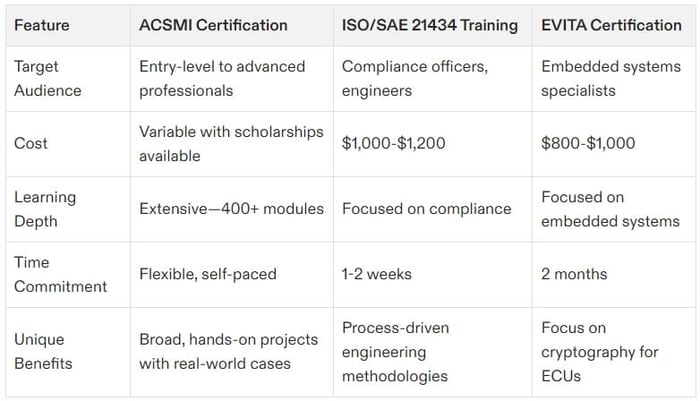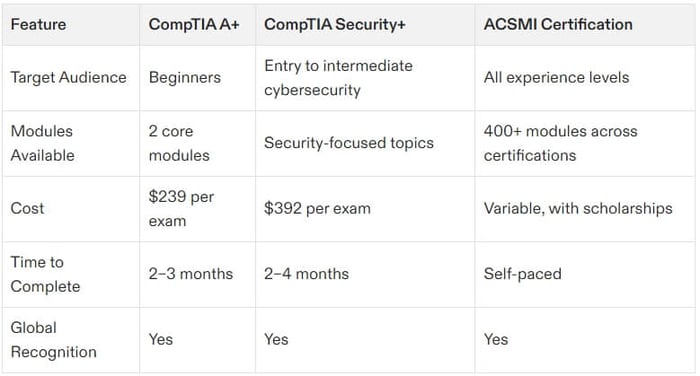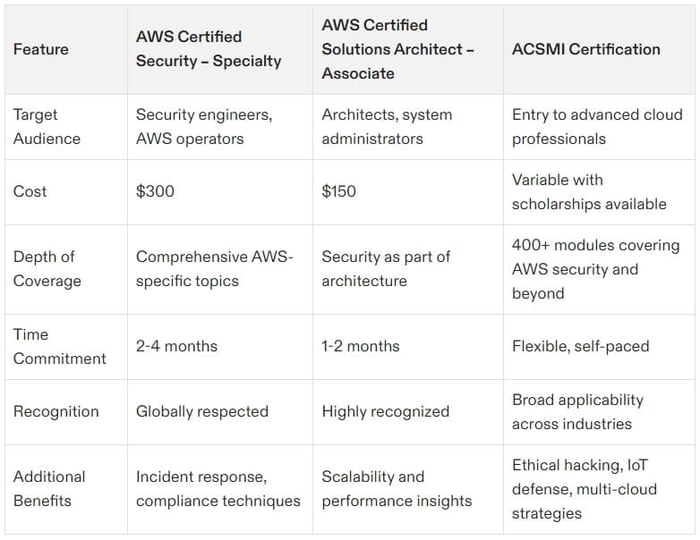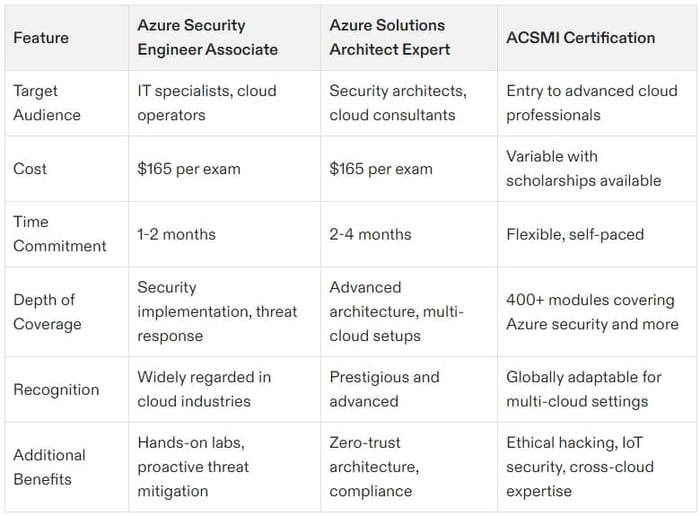Table of Contents
The automotive industry is undergoing a digital revolution, leveraging smart technologies such as IoT, autonomous driving, and cloud-based services. However, with increased connectivity comes increased vulnerability. Cyber threats to automotive systems are rising, from remote hacking of control units to ransomware attacks on manufacturing plants. This has made cybersecurity certification automotive programs essential for professionals in the sector. Whether you're an automotive engineer, a cybersecurity specialist, or a company executive, the right certification can enhance your skillset and help protect the future of this evolving industry.
Whether you're curious about the benefits, the best programs available, or how to get started,
Why Cybersecurity Is Vital in Automotive
The automotive sector faces unique cybersecurity threats. Unlike other industries, a breach in automotive systems can result in life-threatening outcomes, such as compromised vehicle controls or hijacked navigation systems. Additionally, cybercriminals target data-rich environments within connected cars, including GPS data, personal information, and software updates.
A cybersecurity certification automotive program is designed to address these challenges. It trains professionals on how to safeguard automotive electronics, detect vulnerabilities, and ensure compliance with international standards like ISO/SAE 21434, which focuses on vehicle cybersecurity.
Top Reasons to Pursue a Cybersecurity Certification Automotive Program
1. Growing Demand for Specialists
With the rapid growth of connected cars and autonomous vehicles, automotive cybersecurity has become an in-demand skill. Automobile manufacturers, suppliers, and even startups are actively hiring professionals with specialized certification to manage emerging threats.
2. Industry-Specific Knowledge
Unlike general certifications, automotive programs focus on the unique needs of the automotive sector. You'll learn specific skills like securing control units (ECUs), mitigating risks in vehicle-to-infrastructure (V2X) communication, and managing secure over-the-air (OTA) updates.
3. Improved Career Opportunities
Employers tend to prioritize candidates with credentials that prove their expertise. Certifications like those offered by ACSMI (Advanced Cyber Security Mastery Institute) help you stand out. Specialized training increases your chances of landing competitive roles in engineering and security architecture, as well as leadership positions like CISO or Vehicle Security Lead.
Learn more about ACSMI certifications to stay ahead in the cybersecurity space.
4. Compliance with Regulations
Governing bodies and international standards like the UNECE WP.29 directive require automotive companies to design cybersecurity into connected cars. Certified professionals are better equipped to meet these compliance requirements efficiently, avoiding penalties and strengthening vehicle safety.
5. Broader Impact
By earning a cybersecurity certification automotive, you’re not only advancing your career—you’re also contributing to safer roads and more reliable transportation systems.
Top Certifications for Cybersecurity in Automotive
When it comes to picking the best programs to enhance your expertise, several certifications cater specifically to the automotive sector.
1. Certified Automotive Cybersecurity Professional (CACP)
This certification focuses on cyber risk management in automotive environments. It covers end-to-end development processes, from threat analysis to penetration testing for ECUs.
2. ISO/SAE 21434 Certification Training
This training concentrates on compliance with the ISO/SAE 21434 standard, which governs cybersecurity engineering processes for vehicles. It’s ideal for engineers and technical managers dealing with automotive development.
3. ACSMI Certification
ACSMI offers unparalleled resources with its 400+ modules covering cybersecurity certification automotive topics. From foundational concepts to advanced areas like secure software gateways and ethical hacking for vehicle systems, this program ensures a thorough education. Learn more about ACSMI here.
Career Roles for Automotive Cybersecurity Experts
Wondering how a cybersecurity certification automotive program can shape your career? Here are some roles you could pursue with the right credentials and training.
- Vehicle Cybersecurity Analyst: Focus on identifying weaknesses in connected systems, ensuring that newly developed features are secure.
- Embedded Systems Security Engineer: Work directly on hardware and software-level defenses for ECUs.
- Penetration Tester for Automotive Systems: Simulate attacks to uncover vulnerabilities before hackers can exploit them.
- Cybersecurity Compliance Specialist: Help companies align with international automotive cybersecurity standards.
- CISO/CTO for Automotive Companies: Take a leading role in managing the overall security protocols for manufacturing plants or technological advancement teams.
FAQs
1. What is cybersecurity certification automotive?
It’s a specialized program that trains professionals to address the unique cybersecurity challenges within the automotive industry. Topics include securing vehicle components, ensuring compliance, and preventing unauthorized system access.
2. Who should pursue automotive cybersecurity certification?
This certification is ideal for automotive engineers, cybersecurity specialists, compliance officers, and business leaders within the automotive sector who want to stay ahead of evolving threats.
3. How is automotive-specific certification different from general cybersecurity certification?
General certifications cover a broad spectrum of IT security topics, while automotive certifications focus on the unique technologies and threats faced by the automotive industry, such as ECUs, V2X communication, and OTA software updates.
4. Why is ISO/SAE 21434 important in automotive cybersecurity?
ISO/SAE 21434 provides guidelines for implementing cybersecurity within automotive development lifecycles. It helps manufacturers create secure vehicles by following best practices from design to operation.
5. Is ACSMI certification suitable for automotive cybersecurity?
Absolutely. The ACSMI program’s 400+ modules include specialized topics on vehicle security, making it a perfect fit for professionals seeking niche expertise.
6. How long does it take to complete a cybersecurity certification automotive program?
Duration varies by program. Most certifications take anywhere from a week for ISO/SAE 21434 training to several months for comprehensive programs like those offered by ACSMI.
7. What roles can I achieve with automotive cybersecurity certification?
Professionals can pursue diverse roles like Vehicle Cybersecurity Analyst, Embedded Systems Security Engineer, and Compliance Manager. With advanced certifications, opportunities expand to leadership roles like CISO or CTO.
8. Which certification is the best starting point for beginners?
Google’s foundational cybersecurity programs or an introductory automotive course from ACSMI are great starting points for beginners.
Certification Comparison
Key Cybersecurity Certifications for Automotive Professionals
When planning your next career move, consider how a cybersecurity certification automotive can bolster your credentials. And if you’re ready for the ultimate specialization, explore ACSMI’s programs today.
The automotive industry is evolving faster than ever before. With connectivity and autonomous systems paving the way for the future, the demand for skilled, certified professionals will only continue to grow. By choosing the right certification, you not only future-proof your career but also take a step towards creating safer, smarter vehicles for tomorrow.





